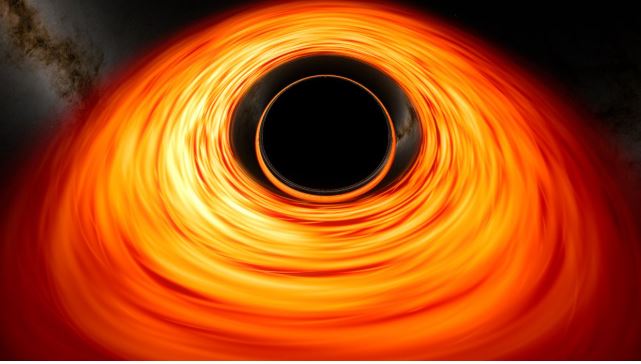


 10:50:20
10:50:20  2025-11-25
2025-11-25  708
708

If you've ever wondered what would actually happen if a microscopic black hole tunneled straight through your body, answers have finally arrived.
And surprisingly, the damage would be pretty minor – at least below a certain mass. In fact, the worst of it would come from the shock wave as it tears through your flesh, much like the ballistic shock delivered by a bullet.
According to a new analysis by physicist Robert Scherrer of Vanderbilt University in the US, even a black hole clocking in at 100 billion tons would do less damage than a 0.22-caliber round.
"Recent observations of gravitational radiation from black hole mergers, as well as new images of black holes, have revived interest in the subject of black holes in general," Scherrer says.
"Plus, I remembered reading a science fiction story back in the 1970s where someone dies from having a black hole pass through them – I wanted to see if this would be possible."
Tiny black holes with sub-stellar masses represent a possible explanation for the mysterious dark matter responsible for the excess gravity we see throughout the Universe.
These so-called primordial black holes could have formed in only one way: from extreme over densities in the early Universe, in the first moments after the Big Bang.
They're not a leading dark matter candidate because scientists think the conditions required to make them would have been rare, even in the turbulence that dominated the Universe at the time.
If they do exist, their contribution is tiny; nevertheless, they are possible, and that possibility naturally raises questions.
Some of these questions include how likely it is that one of these black holes would hit a person, how big it would have to be to do damage, and what that damage would look like – so Scherrer got to work performing calculations.
Here's where it gets truly mind-boggling. The minimum mass for a primordial black hole to cause significant damage as it passes through your body is about 140 quadrillion grams – about 140 billion metric tons, around seven times heavier than the asteroid Toutatis.
At this mass, the black hole is tiny, with a Schwarzschild diameter of just 0.4 picometers. The diameter of a hydrogen atom, for context, is around 106 picometers.
So, if a tiny black hole breezes through at a velocity of around 200 kilometers (124 miles) per second, it wouldn't interact much with the tissue around it, Scherrer found.
However, that velocity is significantly faster than the speed of sound in dry air, and the supersonic shock generated in the black hole's wake would tear into the flesh of the victim like the supersonic shock of a 0.22 bullet.
But that's not the only way a black hole of sufficient mass could potentially harm you. Black holes exert a gravitational pull on objects that stray close enough to be affected, but that pull is not evenly distributed.
The part that is closer to the black hole is pulled more strongly, resulting in a gradient we call a tidal force. Tidal force stretches objects and tears them asunder, a process known as spaghettification.
Gravity, though, is week. The forces holding your flesh and the atoms that make it are stronger than gravity at those scales. You exist on a planet every day that has a mass of nearly 6 sextillion metric tons, and your cells don't fall apart.
For a primordial black hole's tidal forces to seriously damage your body, it needs to have a mass of at least 7 quintillion grams, or 7 trillion metric tons, to affect the most sensitive tissue in the human body: the brain.
That's comparable to the mass of asteroid Iris.
Only at this minimum threshold will the black hole's gravity be massive enough to stretch and spaghettify your tissue on significantly damaging scales – by which point the supersonic wake has probably done enough damage on its own.
Either way, you're probably not in for a good time. But it's nowhere as bad as the black hole completely devouring you from the inside out, like they can eat stars.
Not that you have much to worry about, though. Given the scarcity of these black holes – if they exist at all – Scherrer estimated the frequency of a black-hole human collision to be about once every quintillion years or so – many times the current 13.8 billion-year age of the Universe.
Humanity probably won’t even be around long enough for such a collision to eventuate. It's possible the Universe itself won’t even last that long.
"Primordial black holes are theoretically possible, but they might not even exist," Scherrer says.
"A sufficiently large primordial black hole, about the size of an asteroid or larger, would cause serious injury or death if it passed through you. It would behave like a gunshot.
"A smaller primordial black hole could pass through you, and you wouldn't even notice it. However, the density of these black holes is so low that such an encounter is essentially never going to happen."
Reality Of Islam |
|

Researchers

A well-know

Scientists

As AI-power
 9:3:43
9:3:43
 2018-11-05
2018-11-05
10 benefits of Marriage in Islam
 7:5:22
7:5:22
 2019-04-08
2019-04-08
benefits of reciting surat yunus, hud &
 9:45:7
9:45:7
 2018-12-24
2018-12-24
advantages & disadvantages of divorce
 11:35:12
11:35:12
 2018-06-10
2018-06-10
 6:0:51
6:0:51
 2018-10-16
2018-10-16
 12:10:56
12:10:56
 2022-11-17
2022-11-17
 8:4:21
8:4:21
 2022-01-08
2022-01-08
 10:43:56
10:43:56
 2022-06-22
2022-06-22
 8:25:12
8:25:12
 2022-03-09
2022-03-09
 7:26:19
7:26:19
 2022-04-08
2022-04-08
 11:34:48
11:34:48
 2022-06-29
2022-06-29
 9:30:2
9:30:2
 2021-11-12
2021-11-12
 5:41:46
5:41:46
 2023-03-18
2023-03-18
| LATEST |